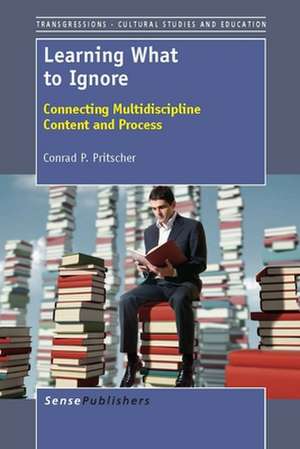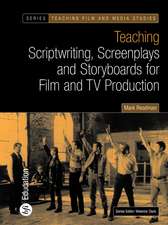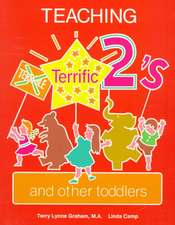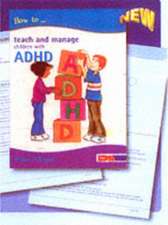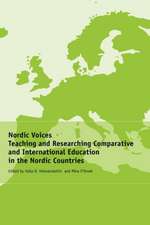Learning What to Ignore: Connecting Multidiscipline Content and Process: Transgressions: Cultural Studies and Education, cartea 93
Autor Conrad P. Pritscheren Limba Engleză Paperback – 31 dec 2012
The book elaborates on David Geoffrey Smith’s question: “Why does so much educational ‘research’ today seem so unenlightening, repetitive and incapable of moving beyond itself? The answer must be because it is ‘paradigmatically stuck’, and cannot see beyond the parameters of its current imaginal space.” The book offers help to go beyond the current imaginal space through what is called kaplearning. Kaplearning can help the reader to defamiliarize the common by facilitating “letting go”.
Pritscher takes an avant-garde approach to learning, pushing the boundaries of the long accepted norm “certainty and order” and modernizing education by trading the old “optimal way” with a new skill to “reason with uncertainty”. This resilience to ambiguity is precisely where human intelligence has full advantage over machine intelligence. Pritscher’s book is impressive and remarkably well-timed, as recent articles in Nature show that online game players can make surprising breakthroughs in science with a well-chosen confluence of effective sources and a bit of creativity with protein folding. Citizen science has led to solutions that scientists and computer simulators have struggled for years, proving that even with little or no scientific training, knowing what to ignore can invite innovating ways to think and execute. Pritscher’s clear and wise insight will definitely serve as an inspiration for the next generation of educators, and prepare the necessary skills for young learners to successfully compete in the future." - Sandra Okita, Department of Math, Science and Technology, Teachers College, Columbia University
| Toate formatele și edițiile | Preț | Express |
|---|---|---|
| Paperback (1) | 312.93 lei 38-44 zile | |
| Brill – 31 dec 2012 | 312.93 lei 38-44 zile | |
| Hardback (1) | 561.41 lei 38-44 zile | |
| Brill – 31 dec 2012 | 561.41 lei 38-44 zile |
Din seria Transgressions: Cultural Studies and Education
-
 Preț: 301.37 lei
Preț: 301.37 lei -
 Preț: 334.69 lei
Preț: 334.69 lei -
 Preț: 245.33 lei
Preț: 245.33 lei -
 Preț: 326.62 lei
Preț: 326.62 lei -
 Preț: 329.29 lei
Preț: 329.29 lei -
 Preț: 219.23 lei
Preț: 219.23 lei -
 Preț: 397.47 lei
Preț: 397.47 lei -
 Preț: 272.40 lei
Preț: 272.40 lei -
 Preț: 242.48 lei
Preț: 242.48 lei -
 Preț: 256.97 lei
Preț: 256.97 lei - 19%
 Preț: 565.49 lei
Preț: 565.49 lei -
 Preț: 232.07 lei
Preț: 232.07 lei -
 Preț: 309.69 lei
Preț: 309.69 lei -
 Preț: 160.15 lei
Preț: 160.15 lei -
 Preț: 240.08 lei
Preț: 240.08 lei -
 Preț: 316.96 lei
Preț: 316.96 lei -
 Preț: 207.68 lei
Preț: 207.68 lei -
 Preț: 268.75 lei
Preț: 268.75 lei -
 Preț: 312.93 lei
Preț: 312.93 lei -
 Preț: 398.44 lei
Preț: 398.44 lei -
 Preț: 320.50 lei
Preț: 320.50 lei -
 Preț: 322.13 lei
Preț: 322.13 lei -
 Preț: 318.51 lei
Preț: 318.51 lei -
 Preț: 333.13 lei
Preț: 333.13 lei -
 Preț: 244.64 lei
Preț: 244.64 lei -
 Preț: 313.85 lei
Preț: 313.85 lei -
 Preț: 242.30 lei
Preț: 242.30 lei -
 Preț: 398.71 lei
Preț: 398.71 lei -
 Preț: 312.93 lei
Preț: 312.93 lei -
 Preț: 254.25 lei
Preț: 254.25 lei -
 Preț: 323.87 lei
Preț: 323.87 lei -
 Preț: 322.13 lei
Preț: 322.13 lei -
 Preț: 312.93 lei
Preț: 312.93 lei -
 Preț: 311.23 lei
Preț: 311.23 lei -
 Preț: 266.96 lei
Preț: 266.96 lei -
 Preț: 407.20 lei
Preț: 407.20 lei -
 Preț: 326.40 lei
Preț: 326.40 lei -
 Preț: 326.40 lei
Preț: 326.40 lei -
 Preț: 331.32 lei
Preț: 331.32 lei -
 Preț: 322.13 lei
Preț: 322.13 lei -
 Preț: 317.14 lei
Preț: 317.14 lei -
 Preț: 317.14 lei
Preț: 317.14 lei -
 Preț: 313.89 lei
Preț: 313.89 lei
Preț: 312.93 lei
Nou
Puncte Express: 469
Preț estimativ în valută:
59.88€ • 62.68$ • 49.84£
59.88€ • 62.68$ • 49.84£
Carte tipărită la comandă
Livrare economică 27 martie-02 aprilie
Preluare comenzi: 021 569.72.76
Specificații
ISBN-13: 9789462091177
ISBN-10: 946209117X
Pagini: 152
Dimensiuni: 156 x 234 x 8 mm
Greutate: 0.24 kg
Editura: Brill
Colecția Brill
Seria Transgressions: Cultural Studies and Education
ISBN-10: 946209117X
Pagini: 152
Dimensiuni: 156 x 234 x 8 mm
Greutate: 0.24 kg
Editura: Brill
Colecția Brill
Seria Transgressions: Cultural Studies and Education
Recenzii
"The acceptance of reason with uncertainty can help learners successfully manage their occupations and lives during the accelerations prominent in the 21st century. As William Ayers states: 'Pritscher tilts his lance at the petrified orthodoxy we call teaching and learning, inviting us on a wild journey into the heart of education.' [..] The book elaborates on David Geoffrey Smith’s question: 'Why does so much educational ‘research’ today seem so unenlightening, repetitive and incapable of moving beyond itself? The answer must be because it is ‘paradigmatically stuck’, and cannot see beyond the parameters of its current imaginal space.' The book offers help to go beyond the current imaginal space through what is called kaplearning. Kaplearning can help the reader to defamiliarize the common by facilitating 'letting go'. [..] Pritscher takes an avant-garde approach to learning, pushing the boundaries of the long accepted norm 'certainty and order' and modernizing education by trading the old 'optimal way' with a new skill to 'reason with uncertainty'. This resilience to ambiguity is precisely where human intelligence has full advantage over machine intelligence. Pritscher’s book is impressive and remarkably well-timed, as recent articles in Nature show that online game players can make surprising breakthroughs in science with a well-chosen confluence of effective sources and a bit of creativity with protein folding. Citizen science has led to solutions that scientists and computer simulators have struggled for years, proving that even with little or no scientific training, knowing what to ignore can invite innovating ways to think and execute. Pritscher’s clear and wise insight will definitely serve as an inspiration for the next generation of educators, and prepare the necessary skills for young learners to successfully compete in the future." - Sandra Okita, Department of Math, Science and Technology, Teachers College, Columbia University
